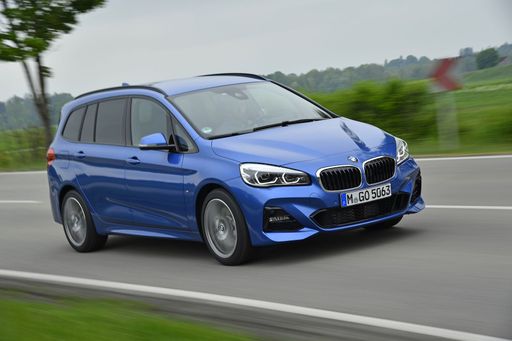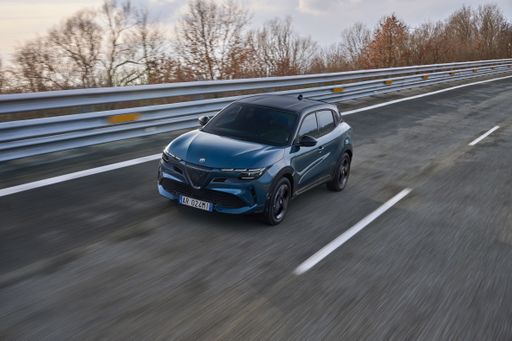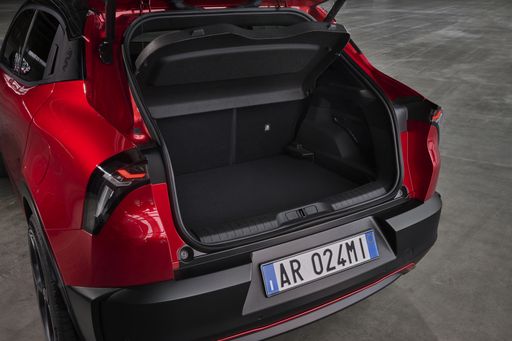Alfa Romeo Junior vs BMW 2 Series Active Tourer – Which one offers the better deal?
Everyday use, family trips or long-distance drives – here’s where the differences show.
Discover whether Alfa Romeo Junior or BMW 2 Series Active Tourer fits your lifestyle better.
Costs and Efficiency:
When it comes to price and running costs, the biggest differences usually appear. This is often where you see which car fits your budget better in the long run.
Alfa Romeo Junior has a clearly perceptible advantage in terms of price – it starts at 25700 £, while the BMW 2 Series Active Tourer costs 31000 £. That’s a price difference of around 5357 £.
Fuel consumption also shows a difference: BMW 2 Series Active Tourer manages with 0.90 L and is therefore convincingly more efficient than the Alfa Romeo Junior with 4.80 L. The difference is about 3.90 L per 100 km.
As for range, the Alfa Romeo Junior performs decisively better – achieving up to 410 km, about 325 km more than the BMW 2 Series Active Tourer.
Engine and Performance:
Under the bonnet, it becomes clear which model is tuned for sportiness and which one takes the lead when you hit the accelerator.
When it comes to engine power, the BMW 2 Series Active Tourer has a somewhat edge – offering 326 HP compared to 280 HP. That’s roughly 46 HP more horsepower.
In acceleration from 0 to 100 km/h, the BMW 2 Series Active Tourer is slight quicker – completing the sprint in 5.50 s, while the Alfa Romeo Junior takes 5.90 s. That’s about 0.40 s faster.
In terms of top speed, the BMW 2 Series Active Tourer performs slightly better – reaching 238 km/h, while the Alfa Romeo Junior tops out at 206 km/h. The difference is around 32 km/h.
There’s also a difference in torque: BMW 2 Series Active Tourer pulls distinct stronger with 477 Nm compared to 345 Nm. That’s about 132 Nm difference.
Space and Everyday Use:
Cabin size, boot volume and payload all play a role in everyday practicality. Here, comfort and flexibility make the difference.
Both vehicles offer seating for 5 people.
In curb weight, Alfa Romeo Junior is somewhat lighter – 1380 kg compared to 1545 kg. The difference is around 165 kg.
In terms of boot space, the BMW 2 Series Active Tourer offers a bit more room – 470 L compared to 415 L. That’s a difference of about 55 L.
In maximum load capacity, the BMW 2 Series Active Tourer performs slightly better – up to 1455 L, which is about 175 L more than the Alfa Romeo Junior.
When it comes to payload, BMW 2 Series Active Tourer to a small extent takes the win – 505 kg compared to 420 kg. That’s a difference of about 85 kg.
Who wins the race?
The BMW 2 Series Active Tourer proves to be leaves the rival little chance and therefore becomes our DriveDuel Champion!
BMW 2 Series Active Tourer is the better all-rounder in this comparison.
 @ BMW Group Press
@ BMW Group Press
BMW 2 Series Active Tourer
Alfa Romeo Junior
The Alfa Romeo Junior captures the essence of Italian design with its sleek lines and compact dimensions, making it an icon of elegance and performance. With a spirited driving experience and a charming retro aesthetic, it appeals to enthusiasts and casual drivers alike. This delightful car embodies the brand's rich heritage while remaining a fun and engaging option for those seeking a unique automotive experience.
details @ Alfa Romeo / Stellantis Media
@ Alfa Romeo / Stellantis Media
 @ Alfa Romeo / Stellantis Media
@ Alfa Romeo / Stellantis Media
 @ Alfa Romeo / Stellantis Media
@ Alfa Romeo / Stellantis Media
BMW 2 Series Active Tourer
The BMW 2 Series Active Tourer offers a blend of versatility and modern design, making it an ideal choice for drivers seeking practicality without compromising on style. Its spacious interior and advanced technology features ensure a comfortable and connected driving experience. With a focus on efficiency and performance, this vehicle stands out as a refined option in the compact MPV segment.
details @ BMW Group Press
@ BMW Group Press
 @ BMW Group Press
@ BMW Group Press
 @ BMW Group Press
@ BMW Group Press
 @ BMW Group Press
@ BMW Group Press
 @ Alfa Romeo / Stellantis Media
@ Alfa Romeo / Stellantis Media
|
 @ BMW Group Press
@ BMW Group Press
|
|
|
|
Costs and Consumption |
|
|---|---|
|
Price
25700 - 41600 £
|
Price
31000 - 48000 £
|
|
Consumption L/100km
4.8 - 5.4 L
|
Consumption L/100km
0.9 - 6.2 L
|
|
Consumption kWh/100km
15.1 - 17.5 kWh
|
Consumption kWh/100km
-
|
|
Electric Range
344 - 410 km
|
Electric Range
85 km
|
|
Battery Capacity
0.4 - 51 kWh
|
Battery Capacity
14.20 kWh
|
|
co2
0 - 119 g/km
|
co2
20 - 140 g/km
|
|
Fuel tank capacity
44 - 45 L
|
Fuel tank capacity
45 - 54 L
|
Dimensions and Body |
|
|---|---|
|
Body Type
SUV
|
Body Type
MPV
|
|
Seats
5
|
Seats
5
|
|
Doors
5
|
Doors
5
|
|
Curb weight
1380 - 1689 kg
|
Curb weight
1545 - 1920 kg
|
|
Trunk capacity
340 - 415 L
|
Trunk capacity
406 - 470 L
|
|
Length
4173 mm
|
Length
4386 mm
|
|
Width
1781 mm
|
Width
1824 mm
|
|
Height
1505 - 1538 mm
|
Height
1576 mm
|
|
Max trunk capacity
1205 - 1280 L
|
Max trunk capacity
1370 - 1455 L
|
|
Payload
390 - 420 kg
|
Payload
465 - 505 kg
|
Engine and Performance |
|
|---|---|
|
Engine Type
Electric, Petrol MHEV
|
Engine Type
Plugin Hybrid, Petrol, Petrol MHEV, Diesel, Diesel MHEV
|
|
Transmission
Automatic
|
Transmission
Automatic
|
|
Transmission Detail
Dual-Clutch Automatic, Reduction Gearbox
|
Transmission Detail
Dual-Clutch Automatic
|
|
Drive Type
Front-Wheel Drive, All-Wheel Drive
|
Drive Type
All-Wheel Drive, Front-Wheel Drive
|
|
Power HP
136 - 280 HP
|
Power HP
122 - 326 HP
|
|
Acceleration 0-100km/h
5.9 - 9.1 s
|
Acceleration 0-100km/h
5.5 - 10.3 s
|
|
Max Speed
150 - 206 km/h
|
Max Speed
195 - 238 km/h
|
|
Torque
230 - 345 Nm
|
Torque
230 - 477 Nm
|
|
Number of Cylinders
3
|
Number of Cylinders
3 - 4
|
|
Power kW
100 - 207 kW
|
Power kW
90 - 240 kW
|
|
Engine capacity
1199 cm3
|
Engine capacity
1499 - 1998 cm3
|
General |
|
|---|---|
|
Model Year
2024 - 2025
|
Model Year
2024
|
|
CO2 Efficiency Class
A, C, D
|
CO2 Efficiency Class
B, E, D
|
|
Brand
Alfa Romeo
|
Brand
BMW
|
What drive types are available for the Alfa Romeo Junior?
Available configurations include Front-Wheel Drive or All-Wheel Drive.
The prices and data displayed are estimates based on German list prices and may vary by country. This information is not legally binding.
